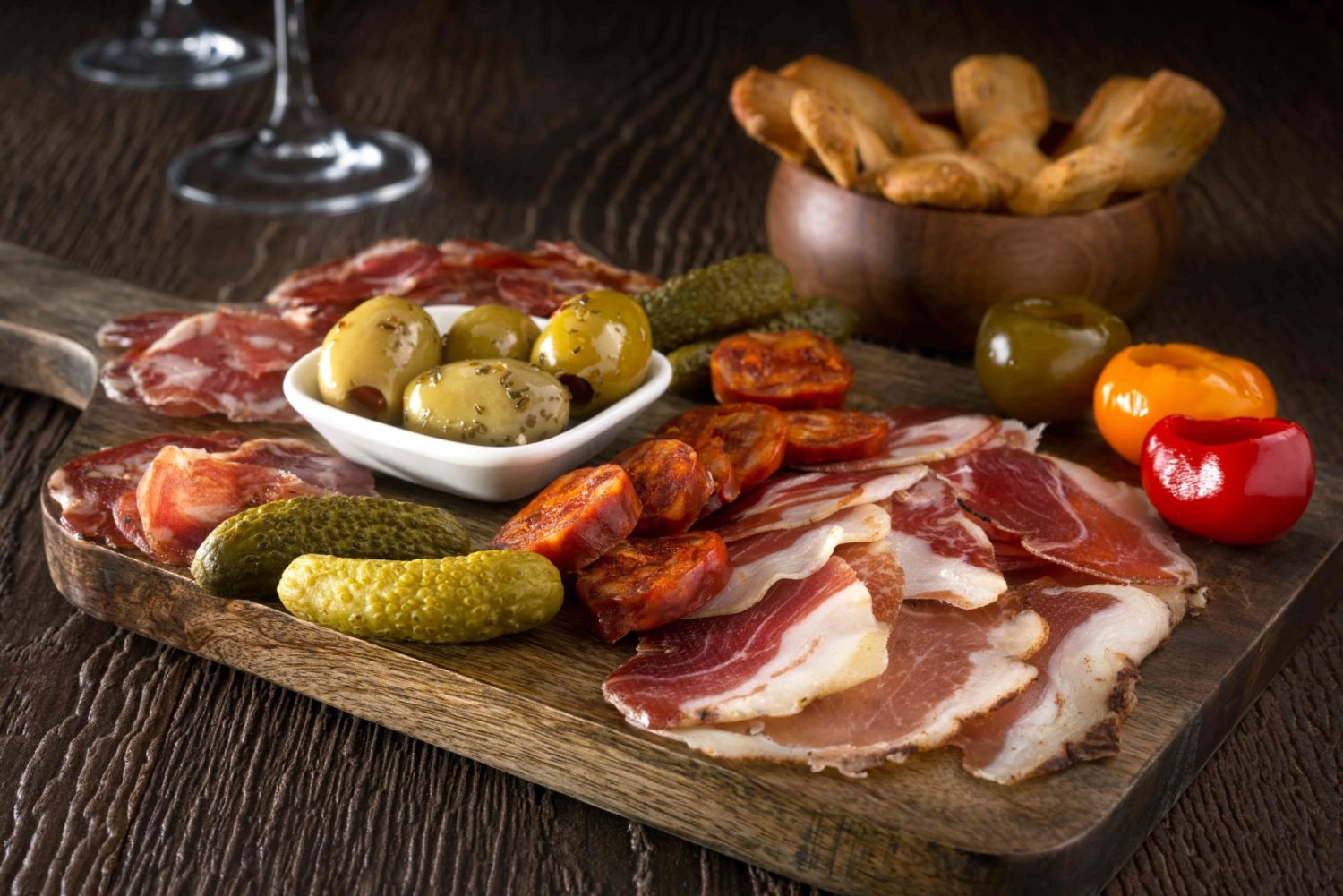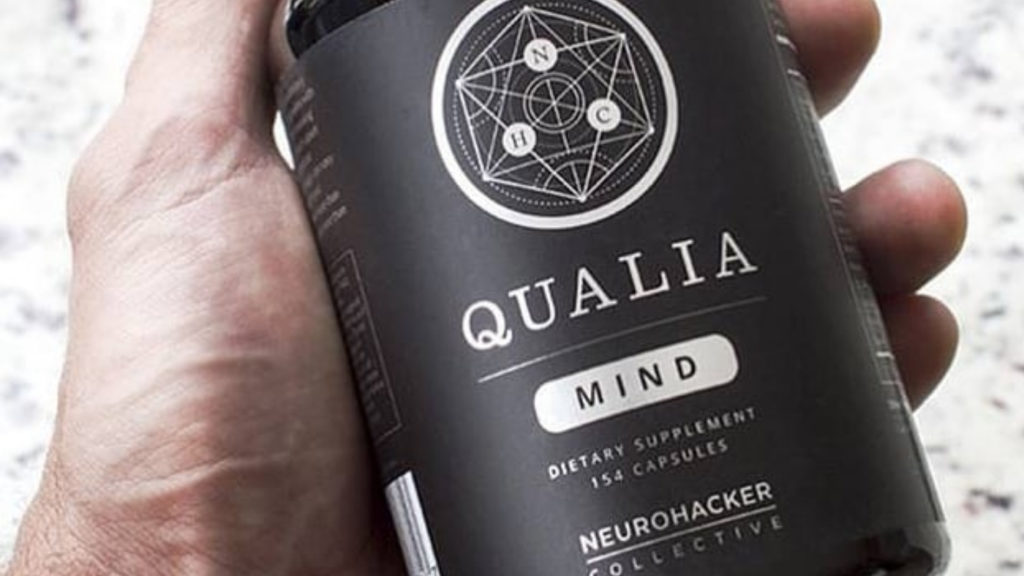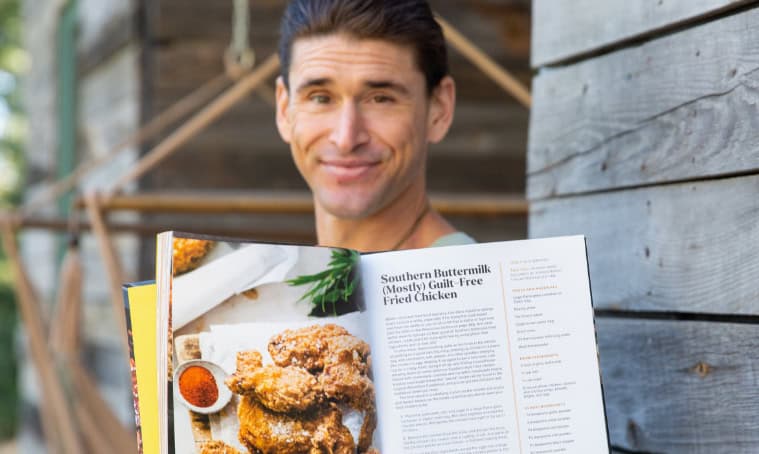December 7, 2021
The last two holiday seasons have been pretty strange.
Thanks to lockdowns, your annual holiday office party probably didn't happen, your last year's Christmas dinner may have just been celebrated with your close, immediate family, and if your New Year's Eve looked anything like mine, you spent it in your pajamas at home.
I don't know about you, but now that life is starting to return to some semblance of normal, I am more than ready to get back out there and celebrate. In fact, this past year I have reflected quite a bit on the importance of community building with family and friends, as I talked about in this podcast episode.
However, as ready as I am to resume revelry, I am just not willing to sacrifice my health to cocktails and desserts. After all, the pinnacle of the holiday season is the new year, and I want to move into 2022 feeling fit, nourished, and happy. This certainly, though, does not mean I want to abstain from pleasure—and I know that that's not what God wants for me, either.
Over the years, I have perfected strategies for holiday eating and drinking that marry health and enjoyment. In Part of 1 of this article, I gave you the first half of my top 10 tips for healthy holiday eating, which, to recap, are:
- Practice intermittent fasting
- Limit alcohol or avoid it entirely (and pair it with a glass of water)
- Minimize holiday-induced stress as well as general stress
- Pre-eat to avoid over-eating at the actual holiday event
- Bring your own healthy, pre-made dish
In this article, I give you a look inside the rest of my arsenal of eating hacks to keep your health and happiness high this holiday season. Oh, and don’t worry, this list of tactics is a deprivation- and guilt-free spread, so dig in.
My Top 10 Foolproof, Zero-Deprivation Tips For Healthy Holiday Eating: #6-10
Healthy Holiday Eating Tip #6: Eat The Good Stuff First
Now that you have your healthy dish to pass planned for that upcoming holiday gathering (remember, this was Tip #5)…
…don't forget to eat it when you get there.
While this may sound obvious, it can be tempting to start in on the pigs-in-a-blanket and artichoke dip if those are what are out when you arrive. But hopefully—if you've followed my advice about pre-eating—you're not famished, and you can make informed choices about the appetizer selections. How many times have you found yourself so full after the cocktail hour that you can barely eat dinner? Your lovely healthy dish is not going to do a whole lot of good if you're stuffed by the time you sit down for your meal.
 On the flip side, if you mindfully select more nutrient-dense, satiating foods first, you will be more likely to resist the poorer choices. This strategy is called “crowding out,” and as outlined in this article by the Institute for Integrative Nutrition, if you start with the good stuff, not only will you have less room for junk, you will learn to ultimately appreciate a greater variety of healthy ingredients.
On the flip side, if you mindfully select more nutrient-dense, satiating foods first, you will be more likely to resist the poorer choices. This strategy is called “crowding out,” and as outlined in this article by the Institute for Integrative Nutrition, if you start with the good stuff, not only will you have less room for junk, you will learn to ultimately appreciate a greater variety of healthy ingredients.
So, what food even is the healthiest? With an overload of information about nutrition out there, you may find yourself wondering about the answer to this question even if you do have a good knowledge base. What I would advise is to keep it simple by choosing only whole foods that are as minimally processed as possible. That may mean that you may skip over the spinach egg cups even though they have spinach and eggs in them if you know that they were popped in the oven from a package.
You also want to consider satiety—more filling foods will also be good choices, for the obvious reason that you will be less likely to overeat if you aren't as hungry. Protein is the most satiating macronutrient, so thinking in terms of protein content when you're approaching the appetizer table is a good strategy. Protein-packed foods also have a higher thermic effect, which means that you expend more energy digesting proteins than you do fat or carbohydrates.
Consuming protein, fiber, and fat prior to carbohydrate intake can lower your body's glycemic response (change in blood glucose) to that Christmas cookie or helping of stuffing. A study in the journal Diabetes Care found a significant reduction in blood glucose levels when protein and vegetables (high in fiber) were eaten prior to carbohydrates. A blood glucose spike can not only can cause short-term mood and quality of life issues; long term, it can contribute to a wide range of conditions from acne to Alzheimer’s disease.
Nuts are generally a crowd-pleaser and, for that reason, they're a cocktail party staple. While nuts qualify as both real food and high in protein, I'm careful about nuts and nut butter because they're high in oxalates. Oxalates, highly reactive compounds consisting of two carbon and four oxygen molecules, are found in a variety of seeds, nuts, and many vegetables—and can, unfortunately, cause a myriad of problems for many individuals with health issues. Nuts are also high in inflammatory omega-6 fatty acids. I'm a big fan of Barukas Nuts, which are much healthier because they're roasted, leaving them with virtually no oxalates. You can reap the benefits of flavonoids, tannins, anthocyanins, antioxidants, and amino acids with Barukas, and they're also high in fiber and protein. Bringing Barukas along to your next holiday party not only ensures a protein-rich pre-dinner snack but probably also serves as a fun conversation starter as they're still relatively unknown. (You can get 15% off Barukas here with code BGF.)
 Other delicious high-protein alternatives include – assuming the “sourcing” is good and healthy – foods and snacks such as steak bites, chicken skewers, smoked salmon, mozzarella balls, and deviled eggs. For vegetables, fermented finger foods such as a miniature pickles and carrot sticks provide fiber and promote gut health. An artful arrangement of a variety of whole foods high in protein, fiber, and fat on a healthy charcuterie board is bound to be a hit at the holiday cocktail party.
Other delicious high-protein alternatives include – assuming the “sourcing” is good and healthy – foods and snacks such as steak bites, chicken skewers, smoked salmon, mozzarella balls, and deviled eggs. For vegetables, fermented finger foods such as a miniature pickles and carrot sticks provide fiber and promote gut health. An artful arrangement of a variety of whole foods high in protein, fiber, and fat on a healthy charcuterie board is bound to be a hit at the holiday cocktail party.
At home, you can put this into practice by avoiding or minimizing the junk food that you keep in the house and making healthier, protein-packed snacks readily available for those times when you're rushed and/or stressed. I find that snacks with crunch are particularly satisfying when the overwhelm hits, such as celery with almond butter or whole-grain crackers. Also, a healthy charcuterie board (as mentioned above) can work as a quick, convenient, and healthy dinner for the family.
Finally, crowding out can also be protective from a mental standpoint. Have you ever arrived at a gathering and started eating poorly to find yourself thinking you might as well keep going? After all, you've “blown it” at that point, which also may happen with the third cookie and beyond at home. Getting off to a healthy start is likely to set yourself up for positive feelings about how things are going food-wise, which hopefully will lead to continued good choices and reasonable portions.
Healthy Holiday Eating Tip #7: Slow Down
Eating more slowly can help you to eat less.
When you take your time with each bite, and thoroughly chew and swallow, you allow the fullness signal from gastric hormones to reach your brain and shut down your appetite before you eat too much.
This response is initiated when partially digested food enters the small intestine. The hormone leptin—which is produced by fat cells—is particularly important as it signals satiety to the brain. Leptin also interacts with the neurotransmitter dopamine in the brain to produce a feeling of pleasure after eating. What research has found is that eating slowly gives this intricate hormonal cross-talk system enough time to work.
Now, you may ask, how slow is slow?
According to the Northwestern Medicine Digestive Health Center, it takes about 20 minutes for your stomach to send a signal to your brain that it’s full. Horace Fletcher, an American Victorian-era health food guru known as the “The Great Masticator,” recommended that food be chewed up to 100 times, ground until it became liquid. He even recommended chewing drinks (probably not necessary :). Ayurvedic practitioners recommend chewing each bite of food 30-50 times, which is certainly more reasonable, though even if you don't get to those numbers—it may not be practical or fun to be counting in your head at that family gathering—you will benefit from mindful and slow chewing. Ayurveda, a natural system of medicine based on the belief that disease is due to an imbalance or stress in a person's consciousness, originated in India more than 3,000 years ago. I find Ayurveda particularly intriguing and have woven it into my personal health protocol. You can listen to my podcast with Dr. Bhaswati Bhattacharya for more.
So, in the words of The Hare & The Tortoise fable, slow and steady wins the (healthy holiday eating) race.
Healthy Holiday Eating Tip #8: Splurge Reasonably
I don't like the word “cheat.”
 Nutrition is highly personal, with no one-size-fits-all food plan (which is why I called Chapter 14 of my book Boundless F&*K Diets: How To Customize Your Nutrition To You), and while there may be foods that you've found it's better for you to avoid because they result in bloating or other negative effects, I'm just not in favor of any diets that universally restrict certain foods.
Nutrition is highly personal, with no one-size-fits-all food plan (which is why I called Chapter 14 of my book Boundless F&*K Diets: How To Customize Your Nutrition To You), and while there may be foods that you've found it's better for you to avoid because they result in bloating or other negative effects, I'm just not in favor of any diets that universally restrict certain foods.
However, I do think that there is value in what I'll instead call a “splurge.” If you find yourself craving food that may not be the greatest choice health-wise, the wisest strategy may be to go ahead and treat yourself. You can allow yourself a reasonable portion of what you're craving to prevent eating a gargantuan amount later. If you enjoy sweets, you could have a piece of chocolate before your sweet tooth totally rages. If chocolate is your thing, there are plenty of healthier choices for chocolate, too, which makes it an ideal splurge (I share my top 10 favorite healthy chocolate brands in this recent article).
A planned indulgence can not only go a long way towards preventing overeating of your favorite foods later, but it can also help you to feel happier, which in turn can even aid digestion and nutrient absorption. A fascinating study was conducted in which iron absorption was measured when people from Sweden were given Thai food and people from Thailand were given Swedish food. In both cases, people absorbed less iron than when they ate the food from their native country, which they presumably enjoyed more. The study also looked at nutrient absorption when both groups were given the same meal, but blended into an ugly brown goo. In this instance, neither group absorbed much iron, likely because it was no fun to eat. As is said in Ecclesiastes 8:15: “Then I commended mirth, because a man hath no better thing under the sun, than to eat, and to drink, and to be merry.”
Healthy Holiday Eating Tip #9: Supplement Wisely
Carbs get a bad rap.
This wasn't always the case; back in the 1990s, a low-fat, high-carbohydrate diet was widely recommended.
The magazine Prevention declared that, “Fat, of course, is what we're all trying to steer clear of.” That ideology, of course, did not last, and with the rising popularity of the Atkins diet and other low-carb plans, foods like bread and pasta were avoided like the plague. While I do not advocate for any specific diet plans, as I discussed above, I am a fan of a low-carb diet if it's done right (you can find out more about what that means in this article).
During this time of year, though, carbs seem to be everywhere, whether it's the Christmas cookies in the office break room, cornbread stuffing, or that holiday classic, fruitcake (though, does anyone really eat fruitcake?). By now, you've hopefully learned that I am not in favor of avoiding foods entirely. If sugar cookies are your thing, indulge thoughtfully—and supplement wisely.
There's one supplement in particular that I highly recommend this time of year. Kion Lean uses the clinically proven benefits of wild bitter melon to support metabolic wellness, assist in weight management, and promote healthy blood glucose levels. To get full benefits of the Kion Lean's blood sugar control effects, simply take 1-2 capsules prior to any of your holiday gatherings in which you plan to eat more heavily.
For appetite control, I'm also a big fan of ketones esters. Ketones are chemicals that are produced in your liver when you don't have enough insulin to turn glucose into energy. When this happens, your body uses fat as the source, converting it into ketones which are sent into your bloodstream for muscle and tissue fuel. Consuming ketone esters also puts your body into this fat-burning mode (ketosis) which may lower your appetite.
KetoneAid is a favorite of ketone ester drink of mine for performance enhancement, improved cognition, and appetite control (use code ben for free shipping up to $20 on KetoneAid). Another ketone ester that's in my regular rotation is H.V.M.N., because it's backed by decades of research and made with clean ingredients. For much more on ketones, including specifically how they help with satiety, you can listen to my podcast with H.V.M.N. founder Geoffrey Woo.
When I have a large meal, I always give my gut an assist with a digestive enzyme supplement like Thorne's Bio-Gest. Bio-Gest supports more effective protein and carbohydrate digestion while minimizing uncomfortable symptoms of indigestion. I don't eat much gluten these days, but if I do go for the bread or pasta, I rely on BiOptimizers Gluten Guardian (save 10% with code greenfield), which alleviates gut irritation. (I took a deep dive into gluten with the BiOptimizers founders on this podcast.)
Finally, if you're going to consume alcohol over the holidays—and if you drink, it's likely to be more frequently and at higher doses this time of year—there are plenty of hacks for minimizing damage and discomfort. In this article about hangover prevention and treatment, you'll find a list of supplements that help your body process alcohol, including magnesium and NAC (N-Acetyl Cysteine). Activated charcoal, which binds to toxins throughout your entire GI tract and moves them out of your body, is definitely stuff I recommend taking with alcohol. You can also search my article feed for “alcohol” for many more resources on how to drink responsibly and healthily.
Healthy Holiday Eating Tip #10: Focus On Family & Gratitude
As a Christian, family and gratitude are two of my top priorities.
There are a number of reasons why you should focus on family and gratitude during the holiday season, but did you know that doing just this also has actual physical health benefits?
In this article I wrote about the benefits of gratitude, I get down to the nitty-gritty of how a focus on gratitude can benefit your health and why it's so important to implement these practices into your routine on a daily basis. That's why it's earned a proper place on this list.
 Practicing gratitude helps improve:
Practicing gratitude helps improve:
- Your physical health. Grateful people experienced fewer aches and pains and were far more likely to take care of their ongoing health, according to a 2012 study.
- Your psychological health. Practicing gratitude can help reduce feelings of anger, envy, resentment, and more, according to various studies I talk about in this article.
- Your sleep. My family and I personally write down a list of things we're grateful for and share these reflections during dinnertime, which leads to a more calming and slowed-down pace, thus producing better sleep and a less stressful, restless mind. A 2015 study backs this up, noting that gratitude not only helps with sleep, but can help reduce fatigue, feelings of depression, and more.
- Your brain. Yes, emphasizing gratitude on a regular basis can help to literally rewire your brain. A study from NeuroImage concluded that the more you focus on gratitude, the more grateful you will feel as your brain adapts to the new mindset.
I often talk about gratitude in my weekly Sabbath Ramblings posts, which gives you a glimpse into my life as a Christian man, father, and husband. In this Sabbath Ramblings post, I talk about the four daily spiritual disciplines that I practice each and every day, one of them being gratitude. The other three consist of service, self-examination, and purpose—and while all of them are equally important, I'm focusing on gratitude for just a moment here.
It's simple to begin implementing the process of graciousness and gratefulness. Simply ask yourself each day, “What am I grateful for today?” I want you to do this right when you first wake in bed. Have a pen or pencil and a notepad or journal next to you on your nightstand when you wake up, ask yourself this question, and begin jotting down what you feel. It could be the simplest and smallest of things, such as hearing the birds chirping outside or your dog's or kid's feet pitter-pattering along the floor.
Practicing gratefulness can truly help you transform your mind to get into the natural habit of feeling gratitude for everything in life, and starting small is a great way to work up to bigger things—like, for me, being grateful for the air I breathe, the eyes that allow me to see, and this body that allows me to perform my daily tasks. There is so much to be grateful for this holiday season and beyond, and I hope these tips help on working to better your gratitude and your health.
Summary
It's no secret that eating healthy around the holiday season can be tough—whether it's the great day of eating and giving thanks or the day of celebrating Jesus's birth, we're constantly surrounded by delicious, albeit unhealthy, food.
There are ways to get around the unhealthy parts of the holiday season, and I hope the tips I've provided above can help with navigating your health through this time of year.
With countless holiday parties and visiting family, there's bound to be a whole feast of food to choose from that may not truly serve you. That's when thinking ahead comes into action and saves the day (and your health!). If you have yet to try pre-planning your holiday food, I highly recommend it. After all, there's no law that says you have to eat what's at the table, right?
So, let's recap my top 10 tips for healthy holiday eating (and for more detail on Tips #1-5, you can revisit last's week article):
- Practice intermittent fasting
- Limit alcohol or avoid it entirely (and pair it with a glass of water)
- Minimize holiday-induced stress as well as general stress
- Pre-eat to avoid over-eating at the actual holiday event
- Bring your own healthy, pre-made dish
- Choose to eat the good, healthy stuff first and minimize the junk food intake
- Eat more slowly, savoring the food you eat
- Splurge reasonably and responsibly if you so choose to
- Use supplements wisely
- Put your focus on family and gratitude
This holiday season, give yourself the gift of health. It’s never too late to change your habits and reap the benefits for the remainder of the festivities. I hope this piece has served as a great starting point for you if you're seriously considering changing up your eating habits for the holidays, while still being able to enjoy a cookie here and there. As we head into the holiday season, many of us will be tempted to indulge in foods that are not good for our health and do not serve us, but there is always a way to eat healthily and still have fun with friends and family during this festive time of year.
What about your upcoming gatherings? Do you have any strategies for healthy holiday eating that I have not included here? If so, I'd love to hear from you below. I read all of your comments.















Pre-eating is an interesting way to go about holiday eating, but I can definitely see how it can be of use, especially when it comes to managing portions later on. Great insight here!